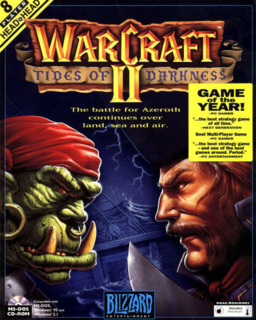Why has this been so addicting? It doesn't add much to the RTS genre: both factions are still carbon copies!
I don't think the plot does much to contribute to this: you don't really get the "feel" that you are actually "in the game" affecting outcomes, and some deaths are just underwhelming, if not superfluous (OMG! LOTHAR DIED! NO CINEMATICS TO ADD TO THE INSULT!)
I played largely the PS version (though by no means a foreigner to the PC version) and can say that the AI is horrid: in one of the maps, the AI push the to build so many naval units that the land front is LARGELY ignored and thus no challenge is offered as the naval units can be picked on by ballistae/katapeltai or the mages/death knights. But then, how was this game addicting enough to burn several day's worth of time?
Perhaps the reason why it has been good wasn't so much that it revolutionized the RTS (it never aimed for that) as it was how Blizzard put together the pieces that they had. BGM perhaps is the one that gives justice to the Warcraft II: it establishes the mood, regal yet gloomy that FITS the Warcraft universe (I still watch the Warcraft II intro a few times just because it's that epic.). The cinematics that the game offers is awesome, particularly the intro. Perhaps the reason for it being a classic may not lay so much as in the difference between factions, but rather the tactical element: FoW for example is a good thing, as this allows for better ambush strategies with the shock troops (that is, the Knights/Ogres) that was the part of the success of the Blizzard's RTS wares. Another element is the sappers, a vulnerable yet powerful weapon that can sabotage economies or take out a chunk of troops (latter being much riskier) that can change the course of the game. But perhaps its ultimate strength is the theme and how they build upon it: a medieval/fantasy world with apocalyptic force, reinforced by sinister mages, gloomy/regal BGMs, and senseless violence in the part of the units.
Yes Indeed, massing is still king (one of the big plague of RTS), but it certainly isn't so shallow it had been.

